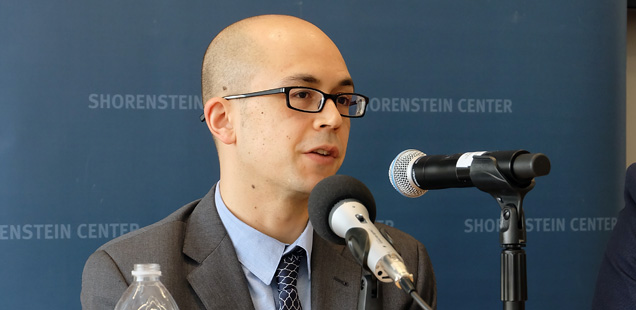
Center News
Ken Burns to give Theodore H. White Lecture on Press and Politics
Newsletter

Our weekly roundup of news found at the intersection of media, politics, policy and technology, from the Shorenstein Center and from around the web. Sign up to receive Media and Politics Must Reads in your inbox each week. Also connect with us on Twitter and Facebook for more updates.
The Atlantic’s Adam Serwer: The Politics of Racism in Trump’s America. Adam Serwer, senior editor at The Atlantic, discussed the role of race and class in U.S. politics, and its media coverage.
Transparency: What’s Gone Wrong with Social Media and What Can We Do About It? A new paper by Wael Ghonim, fall 2017 fellow and author of Revolution 2.0, traces what went wrong with social media and proposes a way to reverse course and put platforms on track to being a productive, responsible, and ethical force.
Local news hurt by broadcast media conglomerate, from Journalist’s Resource.
Six Lessons about Email and Audience Growth for Nonprofit News. Practical tips from our Single Subject News Project.
Beware of A.I. in Social Media Advertising. Dipayan Ghosh, Joan Shorenstein Fellow, writes, “As Facebook, Google, Twitter and like companies now contritely cover their tracks and comply with the government’s requests, they simultaneously remain quiet about a critical trend that promises to subvert the nation’s political integrity yet again if left unaddressed: the systemic integration of artificial intelligence into the same digital marketing technologies that were exploited by both Cambridge Analytica and the Internet Research Agency.”
The march of the hope-mongers. E.J. Dionne, Jr., former visiting faculty member, writes, “There are tough-minded reasons to believe that the cynics are wrong, even if the fight ahead will be as hard as they say. To begin with, Saturday’s marches achieved something that had never been accomplished before. Guns have long been a voting issue for those who insist that any and every restriction on firearms is a danger to freedom. These marches finally established guns as a voting issue for those who (as the signs carried by demonstrators declared in various ways) place the desire to save innocent lives ahead of preserving unlimited access to weapons.”
Ranking the Gatekeepers. Daniel Alphonsus, HKS student and Shorenstein Center research assistant, asks “If companies can have credit ratings, why can’t newspapers have accuracy ratings?”
Future of Policy. The Kennedy School Review, an HKS student publication, focuses on emerging policy challenges such as algorithms and machine learning, the future of work, transparency, and privacy in a new series.
Lawrence K. Grossman, Head of PBS and Then NBC News, Dies at 86. The Shorenstein Center remembers Lawrence K. Grossman, a former Visiting Stanton Professor.

Center News

Center News

Center News